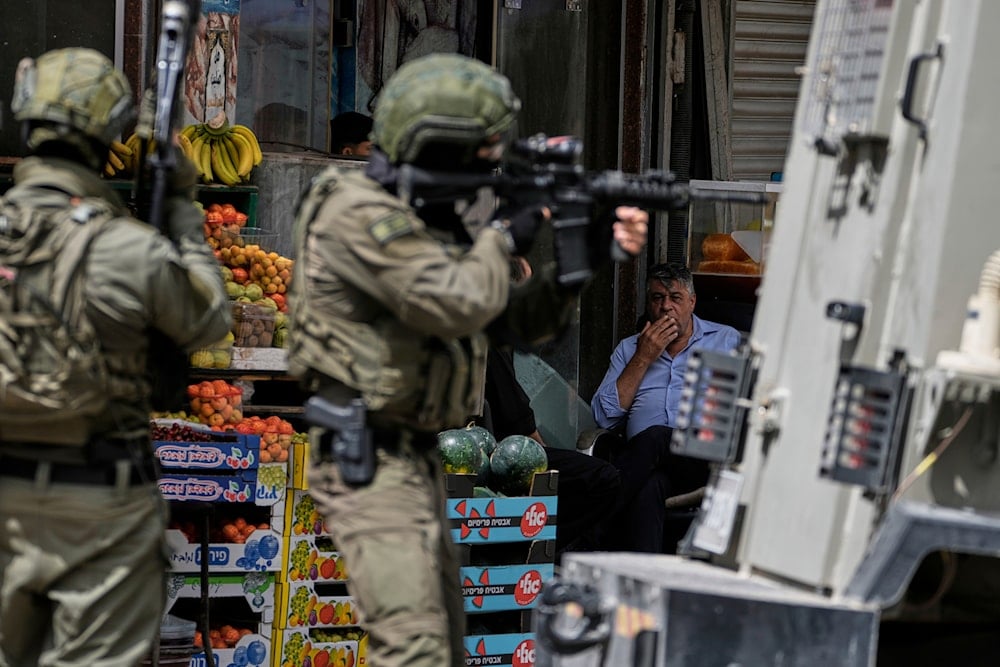Israelis tired amid military stalemate 600 days into Gaza war
After 600 days of war on Gaza, signs of Israeli military, political, and societal fatigue are growing, with no political solution in sight, according to Israeli media.
-

A Palestinian observes Israeli soldiers taking position on a street during a raid in the West Bank city of Nablus, on May 27, 2025. (AP Photo/Majdi Mohammed)
Over 600 days since the beginning of the war on Gaza, signs of deepening Israeli exhaustion, militarily, politically, and socially, are beginning to surface, as reported across Israeli media. With no political solution in sight, the ongoing war is described as directionless, protracted, and draining on all levels.
In an opinion article published in Israel Hayom, journalist Karni Eldad voiced the growing fatigue looming over Israeli society, discussing "the exhaustion of Israeli soldiers, captives and their families, and settlers as well," describing an entity stretched thin by the duration and ambiguity of the war.
Eldad openly questioned the trajectory of the war, stating, “This war seems very, very, very long,” adding that while its goals are often recited “by heart while we sleep,” they remain unachieved. She went further, asking, “Perhaps we have forgotten how to win?”
The article reflects a sentiment gaining traction across "Israel", where the absence of a coherent strategy has become more glaring as the war drags on. She asserted, “This war must end soon...We must take some rest, lick our wounds, and live in a place of peace for at least 40 years, until the next round.”
An in-depth report by Yoav Zeitoun in Yedioth Ahronoth also highlights the operational and strategic fatigue of "Israel’s" military establishment, painting a grim picture of the entity facing five open war fronts: Gaza, Lebanon, Syria, Yemen, and the West Bank, without any viable political plan to end the military assaults.
Zeitoun stresses that "Israel" is operating under extreme pressure with no political solution for Gaza or the broader conflict, adding, "We are dealing with repetitive military engagements and declining strategic returns."
Repetitive operations and strategic stalemate in Gaza
In the Gaza Strip, the ongoing Operation 'Gideon's Chariots' has slowed considerably. Zeitoun notes the repeated incursions into the same territories since the start of the war, describing a stagnation in military progress.
Despite discussions about dismantling the Gaza Strip and eliminating resistance strongholds, no proposal has been presented for a "post-Hamas" political order. “Two million Palestinians live there and are not going anywhere,” Zeitoun points out.
A senior Israeli officer claimed the operation could be completed within two months, though similar promises were made earlier in the war, only to be followed by months of continued confrontations.
On the Lebanese front, a fragile calm is maintained through a US-Lebanese mechanism. There is no official ceasefire, yet the mechanism has thus far prevented full-scale escalation.
In Syria, the Israeli army occupies nine positions near the border, with rising tensions in rural areas such as the Raqqad River and Yarmouk River zones. Armed confrontations continue in some villages, and there are reports of direct negotiations between Israeli representatives and those of al-Sharaa's government aimed at securing long-term calm. US President Donald Trump has reportedly proposed Syria’s inclusion in the normalization agreements.
Yemen presents an ongoing threat, with missile and drone attacks targeting "Israel" every two days since the Gaza war reignited. The strategic strike on Ben Gurion Airport three weeks ago exposed weaknesses in air defenses, raising economic concerns as airfares climb ahead of summer holidays and religious observances. While Israeli strikes on Yemen resumed following the airport incident, their effect has been limited.
Sanaa International Airport, previously targeted, has resumed operations, and Ansar Allah continues to target the occupied territories with near-daily aerial threats. In turn, Trump’s announcement of a maritime trade agreement involving Yemen, reportedly accepted by "Israel", marked another turning point.
In the occupied West Bank, particularly in Jenin and Tulkarm, "Israel" maintains a heavy military presence. Engineering barriers are isolating camps from surrounding cities, leading to reduced security alerts and the destruction of resistance infrastructure, according to Israeli media. However, the looming challenge remains: what happens when Israeli forces withdraw and responsibility is handed to Palestinian security forces?

 4 Min Read
4 Min Read










